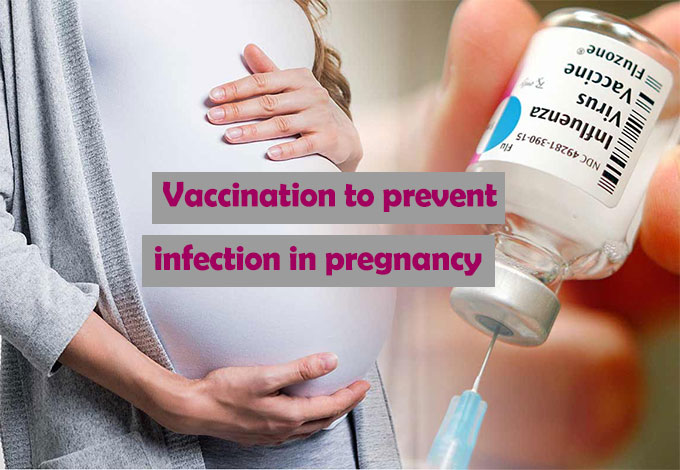Everything you need to know about infections during pregnancy

During pregnancy, some common infections, such as the cold, usually don’t cause serious problems, but other infections can be dangerous to the mother, fetus, or both, leading to premature birth, low birth weight, and even birth defects. Today’s article is devoted to infection during pregnancy and the effect of maternal infection on the fetus. Stay with us until the end of this article.
What is the most common infection in pregnancy?
Pregnant women get various infections, some of which we will mention in this section.
1. Vaginal infection
Vaginal infection in pregnancy includes the following:
Fungal infections of the vagina: Vaginal yeast infections are caused by a fungus called Candida. These infections occur during pregnancy due to changes in the immune system, increased glycogen production, and increased estrogen. About 20% of all women have Candida, which increases up to 30% during pregnancy. It seems that this infection is most common in the second and third trimesters of pregnancy.
Related posts: What is gestational diabetes and how can it be controlled?
Symptoms of fungal infection
The most common symptoms of vaginal yeast infection are:
- Itching around the vagina
- Vaginal discharge that is thick, white, and looks like cottage cheese
- Pain or burning in or around the vagina
- Pain or burning during sexual intercourse
Causes of fungal infection
The following factors increase the risk of infection during pregnancy:
- Taking antibiotics which can change the balance of yeast and bacteria in the vagina.
- Poorly controlled diabetes.
- Illnesses such as HIV or medicines such as corticosteroids affect the way the immune system works.
- A pregnant woman’s wife suffering from a yeast infection and its transmission through vaginal sex.
- During pregnancy, changing hormone levels upset the pH balance in the vagina. Changing the pH creates a more conducive environment for fungal growth.

How to treat a yeast infection?
There are many suppositories, creams, and oral medicines to treat infections, but these medicines should not be used by pregnant women without consulting a doctor or midwife. Remember that oral fluconazole is not recommended for treating yeast infections during pregnancy, as it can cause birth defects. Therefore, before doing anything, first, get advice from a doctor through an online consultation with an obstetrician and gynecologist.
Ways to prevent fungal infection
Observing the following tips will help prevent infections during pregnancy:
- Wear cotton underwear to keep the vaginal area dry and allow it to breathe.
- Always clean yourself from front to back after defecation. Don’t use a vaginal douche, as it can upset the balance of the vagina.
- Avoid wearing tight pants. Immediately take off a bathing suit or sweat-soaked clothing. This keeps the genital area dry.
- If you have diabetes, control your blood sugar.
Bacterial vaginosis
Bacterial vaginosis (BV) is a bacterial infection that occurs in the vagina and is easily treated. Research on the risks of vaginal infection in pregnancy shows that if bacterial vaginosis is not treated in time, it can lead to premature delivery and a low birth weight baby.
Symptoms of bacterial vaginosis
About 50-75% of women with bacterial vaginosis do not experience any symptoms. Other women may experience the following symptoms:
- The sensation of itching, burning, or pain in the vagina.
- Smelling the smell of smell from the vagina.
- The bad smell that gets worse after sex
- Lots of thin and gray discharge
- A woman picking her nose due to an infection while pregnant and a bad smell from her vagina
- Smelling fish from the vagina is one of the symptoms of bacterial vaginosis.
Causes of bacterial vaginosis
Bacterial vaginosis is the result of the overgrowth of certain bacteria in the vagina. Doctors don’t know exactly what upsets the balance of vaginal bacteria and causes bacterial vaginosis.
However, some factors can increase your risk of infection, including:
- Use of the vaginal douche.
- Unprotected sex
- Use of antibiotics
- Vaginal use of drugs.
How to treat bacterial vaginosis?
Your doctor determines how to treat vaginal infections during pregnancy. Bacterial vaginosis is often treated with antibiotics (oral pills and vaginal creams). Do not stop taking the medicine unless your doctor tells you to. It is important to complete the course of treatment to prevent the recurrence of the infection during pregnancy.
Ways to prevent bacterial vaginosis
To reduce the risk of bacterial vaginosis, do the following:
- Minimize irritation of the genital area, wear cotton underwear, and don’t use soap, even unscented soap, to clean the outside of the vagina.
- Do not use douches. Douching removes the bacteria that protect the vagina from infection.
- Use condoms during sexual intercourse.
Group B Streptococcus
Group B streptococcus, or GBS, is a gram-positive bacteria that is often found in the vagina and rectum. Infection with this bacterium is transient, meaning it comes and goes in our bodies.
Group B strep is usually harmless and doesn’t cause symptoms or even an infection, so most people don’t realize they have it. But women who have GBS in their bodies during childbirth can pass it on to their baby in 1-2% of cases. On rare occasions, GBS can be fatal in a newborn baby.
In cases where there is the possibility of transmission of group B strep to the baby, the injection of antibiotics at the time of delivery can significantly reduce the risk of transmission of the infection.
Uterine infection
Uterine infections often occur when bacteria from the vagina travel to the uterus. Thus, untreated vaginal infection increases the risk of uterine infection.
Not treating the vaginal infection causes the transfer of bacteria to the uterus and uterine infection. Uterine infection can be dangerous for a variety of reasons. The infection can affect the placenta, harm a developing fetus, increase the risk of premature birth, or cause birth defects. It can also make childbirth more dangerous and difficult. Some people can experience organ failure and other dangerous side effects.
Uterine infection is treated with antibiotics and may require hospitalization. If the mother develops a fever during labor, the doctor or midwife will monitor the fetus. If your symptoms are severe, your doctor may recommend a cesarean delivery.
Other types of infection during pregnancy
Pregnancy causes many changes in the body and increases a person’s vulnerability to infections and complications. For example, during pregnancy, changes in hormones affect the skin, causing severe dry skin or eczema. In this situation, if the skin cracks and bleeds, a serious skin infection such as cellulitis develops. There’s also a rare skin disorder called Sweet’s syndrome, which is more common during pregnancy.
Other infections that can be associated with serious pregnancy complications include:
- Influence
- Hepatitis E
- Herpes, including herpes simplex virus (HSV) and varicella-zoster virus (VZV)
- Listeria can cause food poisoning
- Measles
- HIV
It’s not clear exactly why the risk of these infections increases during pregnancy. Hormonal changes or other changes in the body that affect the number of blood cells appear to play a role in its occurrence. For example, toward the end of pregnancy, the number of T cells that help fight infection decreases.
On the other hand, blood circulation and the need for cardiac activity increase during pregnancy, which aggravates the complications. For example, if a pregnant woman gets pneumonia due to her flu, she will experience more breathing problems due to the fetus’s need for the mother’s heart and lungs.
During pregnancy, due to the reduction of immune cells, the possibility of contracting certain infections such as the flu increases.
Some medications that can effectively treat common infections are safe to use during pregnancy. Pregnant women with infections are advised to discuss the benefits and risks of different options with their doctor or midwife.
Frequently asked questions
How can I fight infection during pregnancy?
There are some ways to fight infections during pregnancy :
- Wash your hands
- Stay up- to- date vaccinations
- Avoid wearing tight pants
- Do not use douches

What infections can affect a fetus?
Infections that may affect your baby in pregnancy :
- Chickenpox
- CVM
- Group B Streptococcus
- Hepatitis B
- Herpes
- HIV
Is there a possibility of HIV transmission from mother to fetus?
A mother can transmit the HIV virus to her child during pregnancy, childbirth, or while breastfeeding. Treatment during pregnancy reduces the chance of transmitting the virus to the baby.
How to treat infection during pregnancy?
How to prevent infections during pregnancy?
What infections are common during pregnancy?
How can infection affect a pregnant woman?
Conclusion
This article provides important and practical information about infections during pregnancy that can help pregnant women better understand how these infections can affect their own health and that of their fetuses.
Among the most important points discussed in this article are issues such as how various infections, including urinary tract infections, sexually transmitted infections, and viral infections, can impact pregnancy outcomes and what steps can be taken to prevent or treat these infections. Overall, this article serves as a useful guide for pregnant women and their healthcare providers to manage infections during pregnancy.
